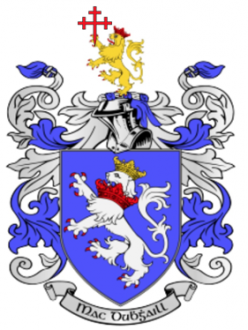The world would be a much lesser place without the tremendous fighting spirit of the Scottish Highland clans.
From the desolate, sea-swept Hebridean Islandsand the croft-scattered western coast, this surname has emerged as belonging to one of the great families whose tradtion is romanticised by the skirl of the bagpipes, the brandished sword, the colourful kilt and the highland games.
Historical researchers, using some of the oldest manuscripts, including Clan genealogies, the Exchequer Rolls of Scotland, the Raman Rolls, the Inquisitio, the Black Book of the Exchequer, parish cartularies, baptismal records, tax records and many other manuscripts, found the name McDowell in Galloway where they were seated from early times and their first records appeared on the early census rolls taken by the early Kings of Britain to determine the rate of taxation of their subjects.
Spelling variations of the name McDowell caused much confusion in research. These changes occurred for a variety of reasons. From time to time the surname was spelt MacDougall, MacDowall, MacDowell, MacDugald, and these changes in spelling occurred sometimes even between father and son. It was not uncommon for a clansman to be born with one spelling, marry with another, and yet another to appear on his headstone. Sometimes a different spelling indicated a religious or clan loyalty to a branch or chieftain.
The Dalriadan race of the Hebrides was anciently descended from the early Irish Kings, specifically King Colla da Crioch, who was banished from Ireland in 327 A.D., along with 350 clan chiefs. Even now, there are Scottish highland clans who still call themselves the “Children of Colla”. Dalriadan King Fergus Mor MacEarca defeated the Picts, their neighbours to the east, in 498 A.D. Kenneth MacAlpine, first King of Scotland, or Alba, or Caledonia, as it was known, was half Dalriadan, half Pict.
The Highland clans were a different breed. In early history many battles were fought with the Scottish King in Edinburgh. Bonnie Prince Charlie finally rallied their support for his claim to the throne which culminated Killoden in 1745.
The surname McDowell emerged as a Scottish clan or family in the territory of Galloway where they were recorded his family great antiquity seated with manor and estates in that shire. They were descended from Dugall eldest son of Somerled, first Lord of the Isles, and his son Duncan he received the lands of Lorn. The clan branched into several stems including that of Uchtred and Duncan, Earls of Carrick and Galloway, but in a battle with the Comyns established a feud with king Robert the Bruce. Duncan McDowell the powerful chief gave allegiance to England’s King Edward and fought against the Scottish king. Although he swore fealty later to King David there remained an element of distrust and the MacDougalls were diminished in both size and stature. The Mackerston branch of Roxborough became more influential in the affairs of the clan. The name was spelled interchangeably: MacDougall, MacDowell, MacDowall, MacDougald. They joined the Prince at Culloden and their lands were forfeited but restored in the same year. Notable amongst the clan from early times was Duncan, Earl of Carrick.
For the next two or three centuries the surname McDowell played an important role in the Highlands and in the affairs of Scotland. However, typical arrangement conflict between Highlanders and Edinburgh, many ancient highland clans have still not officially been recognised as clans by the Lord Lyon of Scotland.
Many clansmen of highland families migrated from Scotland to Ireland during the 17th and 18th centuries. They were granted the lands of the native Catholic Irish. 91 families of MacDowell settled in Antrim and down.
However, to many, life in Ireland became a disillusionment. Conditions were little better than in their homeland. Poverty prevailed, and the religious conflicts remained, except that now they were in a strange land and without the support and kinship of the clan. The New World beckoned to the adventurous.
Clansmen sailed aboard the small sailing ships known as the “White Sails” which plied the stormy Atlantic, ships such as the Hector, the Rambler and the Dove, indenturing themselves for as long as ten years to pay their passage. These ships originally designed for 100 passengers, but frequently sailed with 400 to 500 people on board. Many ships arrived with only 60 to 70% of their overcrowded passenger list, the rest dying at sea.
In North America, the Highlander settled Virginia, the Carolinas, Pictou, Nova Scotia and the Ottawa Valley. One of the first migrants which could be considered a kinsman of the name McDowell, of that same Clan or family, was Ralph, Patrick and Mary MacDougal settled in Charles Town South Carolina in 1767; Dougal and Hugh MacDougal settled in Charles Town in 1767; Andrew MacDowell and his wife settled in Charleston in 1821; Alexander, Andrew, Elizabeth, James, Janet, Jane, John, Margaret, Peter, William MacDowell all settled in Charles Town South Carolina in 1767; Charles, Daniel, David, Hugh, James, John, Thomas and William MacDowell all arrived in Philadelphia between 1840 and 1870. In Newfoundland, Archibald McDougal settled in St John’s in 1813; Thomas settled in Tickle Cove in 1862; Laughlin was a fisherman of Cape Ray in 1871; Angus and John settled in Cod Roy and Rivers in 1871; Michael was a farmer in Colliers in 1871.
The American war of independence found many who are loyal to the new calls, who is remaining loyal to the crown trekked north to Canada and became known as the United Empire Loyalists.
Many prominent people enjoy the distinction of this name John MacDougald, Canadian Industrialist; Cyril MacDougall, Australian Master Builder, Douglas MacDougall, Australian Administrator; Robert MacDowall, British Physiologist; Charles MacDowell, Canadian Chemist; Madame Elizabeth MacDougall of MacDougall, Clan Chief.
